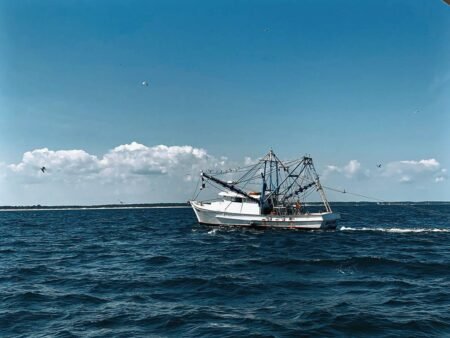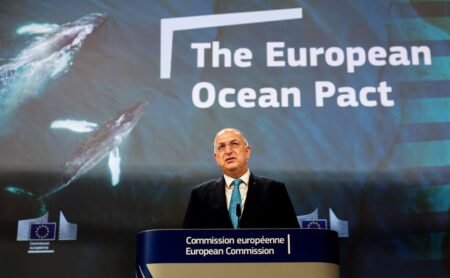The European Commission continues action to fight illegal fishing worldwide by notifying the Republic of Ecuador that it needs to step up its actions (yellow card) in the fight against illegal, unreported and unregulated (IUU) fishing.
Advertisement
On IUU fishing in general
What is IUU fishing?
IUU fishing stands for illegal, unreported or unregulated fishing as defined in the 2001 FAO International Plan of Action to fight IUU fishing.
The European Union IUU legislation applies to all fishing vessels, under any flag, in all maritime waters.
A fishing vessel is notably presumed to engage in illegal, unreported and unregulated fishing activities if it is shown to carry out activities in contravention with the conservation and management measures applicable in the area concerned. This includes, inter alia, fishing without a valid licence, in a closed area or during a closed season, or using a prohibited gear, as well as the failure to fulfil reporting obligations or obstruction of the inspectors’ work.
Why is the Commission committed to solve the IUU fishing issue?
IUU fishing is one of the most serious threats to the sustainable exploitation of living aquatic resources and hence jeopardises the foundation of the Common Fisheries Policy (CFP), as well as the EU’s international efforts to promote better ocean governance. IUU fishing also represents a major hazard to the marine environment and marine biodiversity. The Sustainable Development Goal 14.4 target aims, among others, to end IUU fishing by 2020.
What is the policy of the EU to fight illegal fishing?
The EU is the world’s largest import market for fisheries products and as such bears a prime market state responsibility in the fight against IUU fishing.
The EU Regulation to prevent, deter and eliminate illegal, unreported and unregulated fishing (IUU Regulation) entered into force on 1 January 2010. It applies to trade of marine fishery products with the EU. It aims to make sure that no illegally caught fisheries products end up on the EU market.
To achieve this, the Regulation lays down a catch certification scheme which requires flag States to certify that fish caught by their vessels and traded with the EU do not stem from illegal fishing activities. The system ensures that countries’ vessels comply with national and regional conservation and management rules as well as with internationally agreed rules.
How does the EU ensure that third countries exporting their fishery products to the EU comply with their international obligations?
So far, 91 third countries have notified the Commission that they have the necessary legal instruments and the appropriate administrative arrangements for the certification of the catches by vessels flying their flag.
The Commission cooperates with a number of third countries and carries out evaluation missions to assess their compliance with their international obligations in the fight against IUU. The Commission puts emphasis on cooperation to solve problems, but there are third countries where the situation is still problematic even after years of informal cooperation. In such cases, the Commission can resort to the different actions established in the EU IUU Regulation vis-à-vis third countries non-cooperating in fighting IUU fishing.
Concretely, when the Commission has evidence that a third country does not fully cooperate in the fight against IUU fishing, it issues a yellow card. With this first step of the process, called pre-identification, the Commission warns the country of the risk of being identified as a non-cooperating country in the fight against IUU fishing. The yellow card triggers a formal dialogue in which the Commission and the third country work together to solve all issues of concern. In most cases, this dialogue works well and the pre-identification can be removed (green card).
However, if progress is not sufficient, the Commission can identify the third country as non-cooperating in the fight against IUU fishing (the so-called red card). The Commission then proposes to the Council to add this country to the list of non-cooperating countries. A red card entails that fish caught by vessels from that country cannot access the EU single market. Of course, dialogue continues and, if new assessments prove that the situation has been rectified, the country is delisted (green card).
An overview of the process is available in this infographic.
How many countries are currently under a red card?
Out of the 25 procedures that have been initiated since 2012, six have resulted in a red card. Only three countries have failed to take until now sufficient measures to lift this red card. These countries are Cambodia, Comoros and St. Vincent and the Grenadines.
A full overview of all past and ongoing procedures can be found at this here.
On IUU fishing and Ecuador
Why has the Commission decided to warn (yellow card) Ecuador that they risk being identified as non-cooperating country in the fight against IUU fishing?
The Commission’s decision to issue a yellow card to Ecuador is based on the identification of serious shortcomings in the mechanisms that the country has put in place to ensure compliance with its international obligations as flag, port and market State.
These shortcomings have been clearly outlined and communicated to the competent authorities in Ecuador, and can be summarised as follows:
- The legal framework in place is outdated and not in line with the international and regional rules applying to the conservation and management of fishing resources.
- Law enforcement is hampered by this outdated legal framework, inefficient administrative procedures and a lenient approach towards infringements. As a result, the sanctioning system is neither depriving the offenders from the benefits accruing from IUU fishing, nor deterrent.
- There are serious deficiencies in terms of control, notably over the activity of the tuna fishing and processing industries.
- These deficiencies undermine the reliability of the traceability system upon which the certification of the legality of the catches is based.
What happens if Ecuador does not improve their situation?
Informal discussions with Ecuador have been ongoing since 2014 and insufficient progress has led to today’s pre-identification. The Commission will evaluate progress in addressing the identified shortcomings within the next 6 months.
The Commission hopes that the issues Ecuador face can be solved through dialogue and cooperation. However, if the country does not fulfil its duties under international law and fails to take remedial actions, the Commission may consider proceeding to its identification (red card) and listing, entailing trade-related measures (ban on imports of fisheries product from Ecuador).
Source: European Commission





